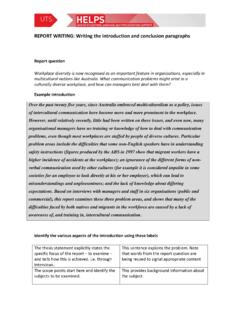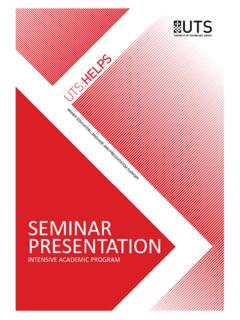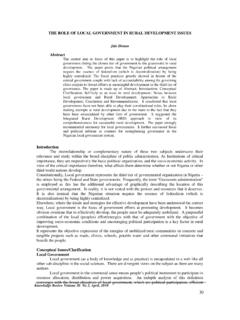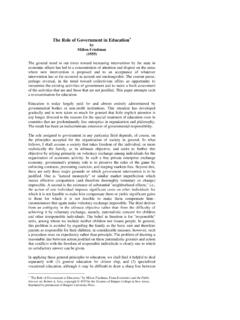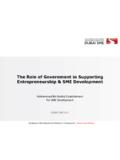Transcription of The Role of Local Government in Local and Regional ...
1 Page 1 of 36 The Role of Local Government in Local and Regional economic Development Page 2 of 36 Acknowledgements The research contained in this report would not have been possible without the financial support of a grant from the Australian Centre of Excellence for Local Government (ACELG) together with the advice and insights of the project sounding board, which comprised key stakeholders from Government , industry and society. We also express thanks to Prof Tony Sorensen who provided an independent peer review and to the input of Prof Roberta Ryan. Individually and collectively, this has helped to shape the structure and content of this report. Last but by no means least; we are grateful to the research participants who were willing to share their experiences, observations and anecdotes.
2 The research team acknowledges the Commonwealth Government as the ACELG funding body. This report is one of the final ACELG-funded projects to be concluded. ACELG formally concluded operations at the end of 2015, with some final projects concluded in 2016 and 2017. All ACELG reports and online resources are now hosted by the University of Technology Sydney Centre for Local Government . Citing this report Pugalis, L., Tan, SF., 2017, The Role of Local Government in Local and Regional economic Development, University of Technology Sydney. ISBN 978-0-646-97763-8 Published September 2017 Document version This work is licensed under the Creative Commons Attribution-Non-commercial International License. To view a copy of this license, visit University of Technology Sydney Centre for Local Government , 2017 UTS CRICOS Provider Code: 00099F UTS CRICOS PROVIDER CODE 00099F UTS CRICOS PROVIDER CODE 00099F Page 3 of 36 Contents Acknowledgements 2 Contents 3 Executive Summary 4 Introduction 8 Going for growth: Contemporary approaches to Local and Regional economic development 8 Local Government and economic development 9 Research purpose 9 The Australian institutional architecture for Local and Regional economic development 11 Commonwealth Government 11 State Governments and Territories 12 Local Government 13 Mapping the institutional architecture of economic development 15 economic development.
3 Contested meanings 19 Towards a framework for understanding Local and Regional economic development: four primary considerations 22 Multi-actor and multi-sector 22 Multiple scales 23 Context 25 Ongoing process 25 The varied roles of Local Government in Local and Regional economic development: key considerations and challenges 27 economic development as a co-responsibility 28 Collaboration and competition between (and within) councils 29 Multi-sector working: the public-private-civic interface 30 Capacity and professional development 30 Conclusion and recommendations 32 References 35 Page 4 of 36 Executive Summary Promoting economic growth is a ubiquitous concern and a priority for all levels of Government in Australia and abroad. Despite a steady stream of reforms, inquiries and initiatives intended to help clarify and improve the effectiveness of the role of Government in economic development; this mongrel policy field continues to evade broad stakeholder agreement (both within and beyond the public sector).
4 Such a condition serves as a barrier to meeting economic growth objectives and broader socioeconomic outcomes. This research seeks to improve our existing understanding of the diverse roles and engagement of councils in the leadership, organisation, delivery and promotion of Local and Regional economic development in twenty-first century Australia. In particular, the lack of legislative clarity about the role of councils in economic development prompted this research. In broad terms, this report should be of interest to all actors and institutions seeking to promote the economic development of places. More specifically, we aim to bring to bear the situated complexity of Local and Regional economic development and the role of councils in this messy endeavour.
5 The research serves to demonstrate how understandings of economic development shape practice. Consequently, this may prompt the Local Government sector together with other actors and institutions to reflect upon their role in Local and Regional economic development. We devise a framework for understanding Local and Regional economic development, which councils, and others, can apply when reviewing their objectives, functions and priorities. This is opportune in view of recent and on-going global, national and subnational transitions and transformations, which are creating new openings for councils to engage more strategically and proactively in economic development. Through a broad-ranging analysis of primary and secondary material we provide key new insights concerning interpretations of Local and Regional economic development; demonstrating how such framings can act as enabling and constraining devices.
6 Mapping the institutional architecture Local and Regional economic development in Australia is highly complex and lacks coherence: institutional architecture is fragmented, uneven and, in some instances, duplicated. In some cases, there is evidence of more competition than collaboration between various Regional structures. Consequently, there is a need for greater clarity of roles and responsibilities among these different tiers and organisations. Each tier of Government has their preferred structures or even multiple preferred structures. At the state level, for example, there is no uniformity in the scope, size and focus of departments, agencies and programs relevant to Local and Regional economic development.
7 However, this is not surprising given the diversity of institutional cultures, socio- economic conditions, and geographies. A key point to note is that Local and Regional economic activities sponsored by state governments are typically unilateral often independent and lacking coordination with Local and federal initiatives. A notable exception is the City Deal policy initiative. Further actions are required to help the incubation of closer intergovernmental relationships. There is merit in piloting Regional Deals in rural and remote areas to complement urban-centric City Deals. Reviewing contested meanings The practice of Local and Regional economic development can mean considerably different things to different organisations, groups and individuals.
8 It is not uncommon for terms, such as, area-based development , Local development , Local economic development , community economic development , Regional economic development and subnational development to be used interchangeably. For example, interviewees suggested that, typically in smaller councils, the responsibility for economic development falls under the community development umbrella. This might help to explain why some Local governments are not always aware of the extent to which they are influencing the development of Local and Regional economies. For some stakeholders, economic development is predominantly concerned with enhancing prosperity and wellbeing, whereas for others economic development escapes a single definition.
9 Responses ran along a continuum between a focus on supporting business and wealth creation to a broader interpretation which Page 5 of 36 encompassed ideas of community development, social equity and sustainability; mirroring growth-focussed and holistic definitions of Local and Regional economic development found in research literature and policy documents. Within a single council, multiple framings of Local and Regional economic development can be invoked, whereby each emphasises particular aspects in accordance with specific political and policy objectives. As a result, a whole-of-council approach to economic development could help to reconcile competing activities. In terms of the (narrower) growth-focussed and the (broader) holistic interpretations of Local and Regional economic development, each can act as both enabling and constraining devices in terms of the role of Local Government in economic development: Growth-focussed framings as an enabling device help to prioritise economic and business issues so that activities are more manageable and results more tangible.
10 Growth-focussed framings as a constraining device if a council opts to focus on statutory responsibilities or if other actors are of the view that growth-focussed economic development falls outside the parameters of the council. Holistic framings as an enabling device help to embed the goal of economic development within the raison d tre of a council or bring into the tent a wider range of services and functions that councils typically perform, which are not usually associated with the goal of promoting economic development. Holistic framings as a constraining device if actors perceive economic development as linked to everything that a council does then it can become the responsibility of everybody and nobody, which can result in inertia or, worse, buck passing.

